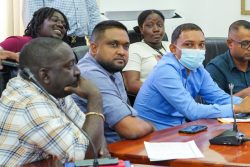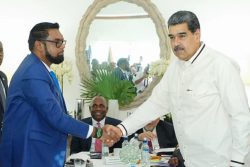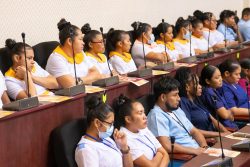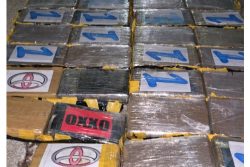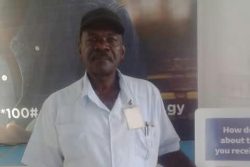In its Executive Summary, the report of the Commission of Inquiry into the March 2nd 2020 General Elections expressed the hope that its work would bring closure to this chapter of Guyana’s sordid electoral history.
The commissioners said: “Finally, we hope that this report will help to bring closure to a sad and shameful chapter in the electoral history of Guyana in which the integrity of and trust in the electoral system of Guyana was undermined and temporarily overthrown by the shenanigans of election officials at the highest level of the system”.
Closure can hardly be attained until the various fraud cases pending against electoral officials reach their denouement although their protracted crawl through the courts has once again affirmed how the judicial system and officers of the court can conspire to deny justice to the people of this country particularly those who were aggrieved by the vulgar attempt to rig the elections in favour of APNU+AFC.
More important though, there is nothing in the report and its labour from which the people of this country can take heart that they won’t be visited by another abomination of this type. There is nothing in the report that will quell the hyper-partisanship that has seized the electoral machinery and which malady expresses itself to varying extents in favour of whichever of the major parties is in the ascendancy.
The delivery of the report was important in the sense that it fulfilled a promise that had been made by President Ali in his inauguration address on August 8, 2020 although he dithered for reasons unknown until June 21st 2022 – almost two years later – before convening the inquiry.
A stark omission in the report of the inquiry is any commentary on the conduct of the Chair of the Guyana Elections Commission (GECOM), retired Justice of Appeal Claudette Singh. It is trite that in any inquiry of this type the person at the apex would come under careful examination. There was much in the public domain about her disposition during the key days when the attempted rigging occurred and moreso in her disastrous testimony before the commissioners themselves. Why she was spared any of the strong language applied to others in the electoral machinery will be a cause for speculation and immediately detracts from the desired evenhandedness of the report.
There is nothing in the terms of reference of the inquiry that could have spared Ms Singh. It required the commissioners to: “Inquire into and report upon the relevant circumstances and events leading up to, and the procedures following, the Regional and General Elections held in Guyana on the 2nd day of March 2020, not limited to but including that which are more specifically set out” and which included “The conduct of the Chief Election Officer, other Elections Officers, and others in respect of the discharge and execution of the statutory duties of the Chief Election Officer prescribed by sections 96 and 97 of the Representation of the People Act, Chap 1:03”.
Ms Singh absented herself from the proceedings at key moments when the first illegal declaration of District Four’s results was made and she has to be fully accountable for that dereliction.
Having declined the opportunity to defend themselves before the inquiry, former Chief Election Officer, Keith Lowenfield; his deputy, Roxanne Myers; and the Returning Officer for District Four Clairmont Mingo quite properly bore the brunt of the blame for the failed attempt to rig the elections.
Following the examination of the evidence before it, the Commission of Inquiry concluded that:
“1. There was a conscious and deliberate – even brazen – effort to violate the provisions of section 84(1) of the Representation of the People Act.
2. In so doing, certain senior GECOM officials abandoned all need for neutrality and impartiality and demonstrated a bias for a competing political party and, in the course of events over those days, showed an open connection with that party and by their efforts sought a desired result for that party.
“After careful consideration and analysis of the evidence before us, it is our considered view that CEO Mr. Keith Lowenfield, DCEO Ms. Roxanne Myers and RO Mr. Clairmont Mingo were principally responsible for clear and deliberate attempts to frustrate, obstruct and subvert the ascertainment of votes in electoral district No. 4.”
The other big losers in all of this are the now divorced APNU and the AFC. They stand accused of having been the intended beneficiaries of this tawdry rigging attempt with the obvious implication that key members of the coalition suborned and directed it. This stain doesn’t wash away easily particularly for its principal component, the PNCR which had occupied office via rigged elections in 1968, 1973, 1980 and 1985. Electorally APNU and the AFC are now confined to their bases – whatever those numbers are – with little hope of any crossover until radical reforms are made.
As expected, the Commission made several recommendations. These included one for the reform of GECOM.
“As it stands, the structure of GECOM is, at its core, politicized, making it difficult for it to operate with any efficiency or effectiveness. Consideration should be given to amending this to allow for more balanced participation from other organizations or professionals with technical expertise thereby reducing the politicization of the electoral process”.
This proposal is not likely to go anywhere as the two main parties relish control of GECOM and constitutional reform is not even on the horizon. The Commission of Inquiry itself recognised that the Carter Center – and a number of others – had recommended since 2001 that alternative models be pursued for GECOM to no avail.
The same will be the fate of the Commission of Inquiry’s recommendation on campaign financing reform.
It said: “Save for the provisions set out in Part XII of ROPA, there is no legislation applicable to campaign financing in Guyana. Accordingly, there is a lack of transparency and accountability regarding political parties and campaign financing. Political parties have historically raised funds without any limitations regarding the source or amount of donation, and with very little obligation to disclose election expenses.
“There is a strong need for such legislation as there is a perception that persons and/or corporations who give large donations stand to gain political favours”.
Given the massive amounts of money swilling around from the oil business, the PPP/C in particular would be disinterested in this provision.
There was very little in the testimony before the inquiry and its findings that the public was not aware of. The dastardly attempt to overturn the will of the people has done enormous damage to the image of GECOM and its Secretariat. With local government election due on June 12 confidence has to be restored in the system as a means of encouraging participation but it isn’t clear that this is possible.

